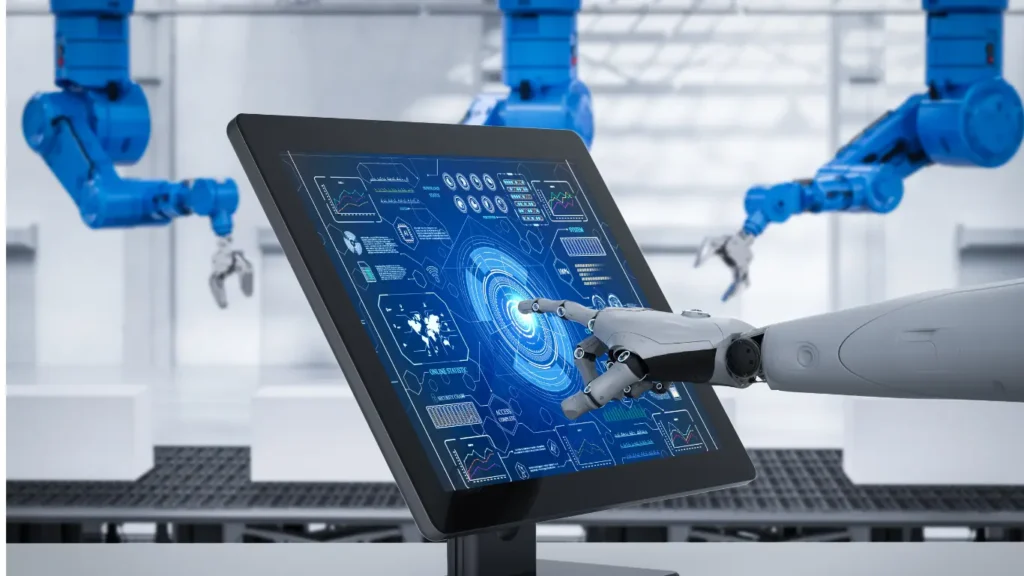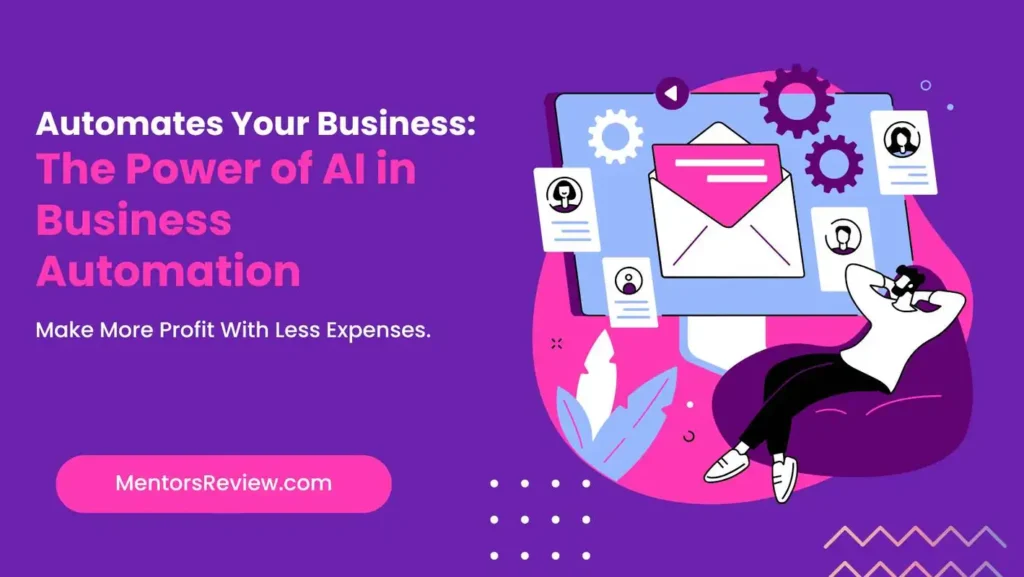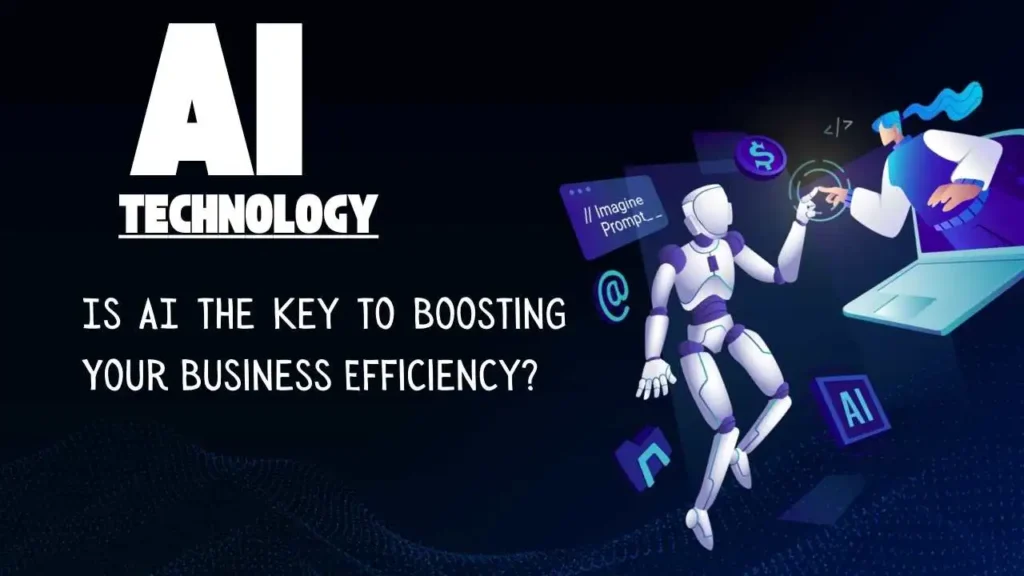
AI for business automation streamlines operations reduces costs, and enhances efficiency. It helps businesses perform repetitive tasks with precision and speed.
Businesses today face increasing demands for efficiency and cost-effectiveness. AI-driven automation offers a solution that handles repetitive tasks quickly and accurately. This technology can process data, manage customer interactions, and optimize workflows, freeing up human resources for more strategic activities.
AI tools like chatbots, robotic process automation, and machine learning algorithms are transforming how companies operate. By integrating AI, businesses can improve productivity, reduce human error, and stay competitive. Investing in AI for business automation is essential for growth and long-term success in the modern marketplace.
AI for Business Process Automation
Artificial Intelligence, or AI, is changing how businesses operate. AI provides tools to automate and streamline processes. This leads to increased efficiency and cost savings.
AI uses machine learning, natural language processing, and data analytics. These technologies help businesses make better decisions and improve customer experiences. Below, we explore the rise of AI and why businesses need it.
The Rise Of Ai
AI has grown rapidly in recent years. It has gone from being a futuristic concept to a practical tool. Many industries now use AI to enhance their operations.
A recent McKinsey survey indicates that 78% of organizations are utilizing AI in at least one business function, with a significant increase in generative AI adoption across marketing, IT, and product development sectors (McKinsey, 2024). This growth highlights AI’s importance in today’s business world and its increasing integration into core operations.
Why Businesses Need Ai
According to McKinsey, AI adoption has become crucial for businesses aiming to improve efficiency and decision-making. A recent survey found that 78% of organizations have adopted AI in one or more functions, with many companies focusing on AI-driven marketing, IT optimization, and predictive analytics (McKinsey, 2024).
Second, AI improves decision-making. By analyzing large sets of data, AI can provide valuable insights. These insights help businesses make informed decisions.
Lastly, AI enhances customer experiences. Chatbots and virtual assistants provide instant support. This leads to higher customer satisfaction and loyalty.
| Benefits of AI | Examples |
|---|---|
| Automation | Automating data entry, scheduling, and other routine tasks. |
| Data Analysis | Analyzing customer data to predict buying patterns. |
| Customer Support | Using chatbots to answer common customer queries. |
In summary, AI plays a crucial role in modern business. It automates tasks, improves decision-making, and enhances customer experiences. Embracing AI can give businesses a competitive edge.
Key Ai Technologies
AI is transforming business automation across various industries. Understanding key AI technologies is crucial as they boost efficiency and streamline operations. Here’s a look at how AI is impacting specific industries:”
-
In healthcare, AI is enhancing diagnostic accuracy and patient care. For instance, AI algorithms are now assisting in early disease detection, leading to improved patient outcomes and reduced healthcare costs.
-
In logistics, companies are implementing AI for predictive maintenance and route optimization, resulting in significant cost savings and improved delivery times.
-
In retail, AI-driven personalized marketing strategies are increasing customer engagement and sales conversion rates, as evidenced by case studies from leading retail brands.
Gartner’s 2024 report highlights a 19-percentage-point increase in organizations deploying generative AI across multiple business units, underscoring the growing integration of AI in supply chain management and other core functions (Gartner, 2024)
Machine Learning
Machine Learning (ML) is a core AI technology. It enables computers to learn from data. This learning improves decision-making over time. ML uses algorithms to identify patterns. Businesses use these patterns to predict outcomes and automate tasks.
Some common Machine Learning applications include:
- Customer segmentation
- Predictive maintenance
- Fraud detection
ML helps in analyzing large datasets quickly. This leads to better business insights and faster decisions. Companies can reduce manual work and increase productivity.
Natural Language Processing
Natural Language Processing (NLP) enables computers to understand human language. It processes and interprets written and spoken words. NLP is key for tasks like text analysis and speech recognition.
Some common Natural Language Processing applications include:
- Chatbots and virtual assistants
- Sentiment analysis
- Automated customer support
NLP helps businesses interact with customers efficiently. It enhances the customer experience by providing quick responses, and also helps extract valuable insights from text data.
Automation Of Routine Tasks
Businesses thrive on efficiency. Routine tasks can take up precious time. AI for Business Automation is transforming industries. Automation of routine tasks is crucial. It saves time and reduces errors. Let’s explore this in detail.
Data Entry
Data entry is repetitive and mundane. It is prone to human error. AI-powered tools can automate this process. They scan documents and input data accurately.
Here’s how it works:
- Scan physical documents
- Extract relevant information
- Input data into systems
Automated data entry improves accuracy. It frees employees for more valuable tasks.
Customer Service
Customer service is vital for business success. AI chatbots handle routine queries efficiently. They provide instant responses to common questions.
Key benefits of AI in customer service:
- 24/7 availability
- Consistent responses
- Faster resolution times
AI-driven customer service enhances customer satisfaction. It also reduces work load on support teams.
AI for Business Automation is a game-changer. It streamlines routine tasks, boosts productivity, and enhances customer experience.

Enhancing Decision Making
Artificial Intelligence (AI) is revolutionizing business automation. It plays a crucial role in enhancing decision-making processes. AI helps businesses make smarter, faster decisions. This leads to improved efficiency and reduced costs.
Predictive Analytics
Predictive analytics uses historical data to predict future outcomes. Businesses can forecast trends, customer behavior, and market changes. This helps them stay ahead of competitors. Predictive analytics also identifies potential risks and opportunities.
| Benefit | Description |
|---|---|
| Trend Forecasting | Predicts future market trends and customer preferences. |
| Risk Management | Identifies potential risks before they become critical issues. |
| Opportunity Identification | Recognizes new business opportunities early. |
Data-driven Insights
Data-driven insights help businesses make informed decisions. AI analyzes vast amounts of data quickly. It identifies patterns and correlations that humans might miss. This leads to more accurate and reliable decisions.
- Improved Accuracy: AI minimizes human error in data analysis.
- Faster Decisions: AI processes data much faster than humans.
- Better Resource Allocation: AI helps allocate resources efficiently.
Businesses gain a competitive edge by leveraging AI for data-driven insights. They can adapt to changes swiftly and make strategic decisions confidently.
Improving Operational Efficiency

Improving operational efficiency is crucial for businesses to stay competitive. AI technologies can streamline processes, reduce costs, and increase productivity. Let’s explore how AI can enhance supply chain management and inventory optimization.
Supply Chain Management
AI can revolutionize supply chain management. It provides real-time data and predictive analytics. Companies can anticipate demand shifts, reduce delays, and optimize routes.
For example, AI algorithms analyze historical data to predict demand. This helps in planning better production schedules and reducing overstock or stockouts. The result is a more efficient and cost-effective supply chain.
- Predictive analytics: AI predicts future demand and trends.
- Route optimization: AI suggests the best delivery routes.
- Real-time tracking: AI monitors shipments in real-time.
Inventory Optimization

AI plays a significant role in inventory optimization. It helps maintain the right balance of stock. Businesses can avoid overstocking or running out of stock.
AI tools analyze sales patterns and customer behavior. This ensures optimal stock levels and maximizes profitability. Companies can also reduce storage costs and improve cash flow.
- Demand forecasting: AI predicts future sales trends.
- Stock level management: AI maintains optimal stock levels.
- Cost reduction: AI helps lower storage and handling costs.
Personalizing Customer Experience
Artificial Intelligence (AI) is transforming how businesses operate, especially in personalizing customer experience. With AI, businesses can tailor interactions to individual preferences. This enhances customer satisfaction and drives loyalty.
Targeted Marketing
AI algorithms analyze customer data to identify preferences. This helps in creating personalized marketing campaigns. Businesses can send targeted advertisements that appeal to specific audiences. AI enables real-time adjustments to marketing strategies. This ensures that the content remains relevant and engaging.
- Analyze customer behavior and preferences
- Create personalized ad campaigns
- Adjust strategies in real-time
Customer Segmentation
AI tools can segment customers based on various criteria. This includes demographics, purchasing behavior, and interaction history. Segmentation helps businesses address specific needs of different customer groups. It improves the efficiency of marketing efforts and customer service.
| Criteria | Examples |
|---|---|
| Demographics | Age, gender, location |
| Purchasing Behavior | Purchase frequency, average spend |
| Interaction History | Customer service interactions, website visits |
Implementing AI for customer segmentation allows businesses to provide personalized experiences. This builds stronger relationships with customers and fosters loyalty.
Challenges And Considerations
Implementing AI for business automation comes with challenges and considerations. These challenges can impact the success of your AI initiatives. Understanding these can help you navigate the complexities of AI integration.
Data Privacy
Data privacy is a critical concern. Businesses need to protect sensitive information. AI systems often require large amounts of data. This data can include personal and confidential information.
To address data privacy, follow these steps:
- Ensure compliance with data protection laws
- Implement robust data encryption methods
- Regularly update your security protocols
Failure to secure data can lead to breaches. Breaches can result in legal and financial consequences. Always prioritize data privacy in your AI strategy.
Implementation Costs
Implementing AI can be expensive. Businesses must consider the costs involved. These costs include hardware, software, and human resources.
Here is a breakdown of potential costs:
| Cost Type | Description |
|---|---|
| Hardware | High-performance servers and storage solutions |
| Software | AI platforms, tools, and licenses |
| Human Resources | Hiring and training AI experts |
Careful planning can help manage these costs. Consider these tips:
- Start with small, manageable projects
- Leverage open-source AI tools
- Partner with AI solution providers
Balancing cost and value is key. Investing in AI can lead to significant long-term benefits.
Future Of AI in Business
The future of AI in business looks very promising. AI is transforming how companies operate. Many tasks are becoming automated. This change is leading to increased efficiency and cost savings.
Businesses are starting to use AI to make smarter decisions. This is helping them stay ahead in the competitive market. Let’s explore the emerging trends and long-term impacts of AI in business.
Emerging Trends
AI technology is evolving rapidly. Here are some emerging trends in AI for business:
- Chatbots: Many companies use chatbots for customer service. These bots can handle simple queries quickly.
- Predictive Analytics: Businesses use AI to predict market trends. This helps them make better decisions.
- Robotic Process Automation (RPA): RPA helps in automating repetitive tasks. This reduces human error and increases efficiency.
- Natural Language Processing (NLP): NLP helps in understanding and processing human language. It is useful for customer feedback analysis.
Long-term Impacts
AI will have many long-term impacts on business. Here are some key impacts:
- Job Transformation: Some jobs will become automated. New jobs will be created that focus on managing AI systems.
- Improved Decision Making: AI will provide more accurate data. This will lead to better decision-making processes.
- Cost Reduction: Automation will reduce operational costs. Businesses can allocate resources more efficiently.
- Personalization: AI will help in creating personalized customer experiences. This will increase customer satisfaction and loyalty.
Businesses need to embrace AI to stay competitive. The future of AI in business is bright and full of opportunities.
Incorporate Real-World Examples and Case Studies
Amazon has leveraged AI-powered robots in its fulfillment centers to automate sorting and inventory management. This implementation has led to a 25% increase in operational efficiency and a 20% reduction in labor costs, as reported in their 2024 annual logistics report.
Frequently Asked Questions
What Is AI for Business Automation?
AI for business automation uses artificial intelligence to perform repetitive tasks. It enhances efficiency and reduces human error.
How Does AI Improve Business Processes?
AI improves business processes by automating tasks and analyzing data. It helps in making informed decisions faster.
What Are The Benefits Of AI in Business?
The benefits include increased efficiency, reduced costs, and improved accuracy. AI also provides valuable insights from data.
Can AI Replace Human Jobs In Business?
AI can automate repetitive tasks but cannot replace human creativity and decision-making. It complements human efforts.
Conclusion
Embracing AI for business automation can revolutionize operations and boost efficiency. It streamlines tasks, reduces costs, and enhances productivity. Implementing AI-driven solutions positions businesses for growth and innovation. Stay competitive by integrating AI into your automation strategy today. The future of efficient business operations lies in harnessing AI technology.

![VideoCreator Review 👉Complete Demo And 🎁Bonuses Worth 💲4947🎁 For👉 [Video Creator Review]👇](https://mentorsreview.com/wp-content/uploads/2026/01/videocreator-review-complete-demo-and-bonuses-worth-4947-for-video-creator-review-150x150.jpg)
![AvatarBuilder Review 👉Demo And 🎁Bonuses🎁 Worth 💲2997 For👉 [Avatar Builder Review]👇](https://mentorsreview.com/wp-content/uploads/2026/01/avatarbuilder-review-demo-and-bonuses-worth-2997-for-avatar-builder-review-150x150.jpg)


